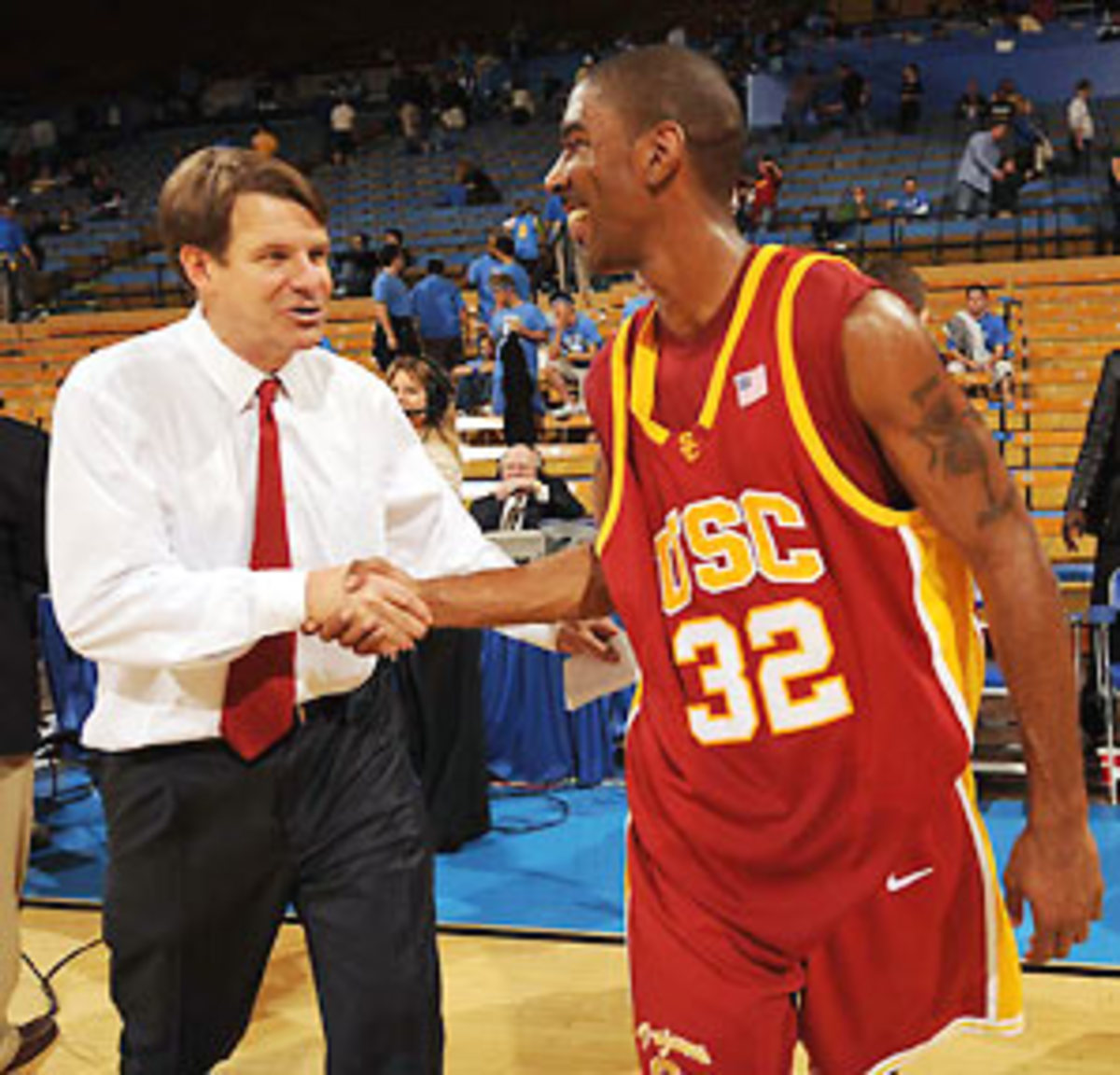USC's self-imposed sanctions are nowhere near severe enough
USC would like you to believe that when it self-imposed sanctions on its basketball program last Sunday, it dropped the hammer on its troubled hoops program.
A ban on postseason play this season, a loss of one scholarship this year and the next, restrictions on recruiting ... It was a litany of wrist slaps that the Trojans hope will be viewed as equitable punishment for the numerous NCAA violations committed during star guard O.J. Mayo's one year in Troy.
"When we've done something wrong," USC athletic director Mike Garrett said, "we have an obligation to do something about it and that is exactly what we are doing here."
What Garrett and the Trojans also did was take everyone, including the members of the NCAA's Committee on Infractions (COI), for fools.
If there was ever a basketball program that deserved to have the book thrown at it it was USC under former coach Tim Floyd. Instead, the Trojans tossed themselves a few pages and hoped no one would notice the difference. It was a response that is likely to be judged harshly by the COI when it reviews the Trojans case down the line. The COI hates cheaters, but it hates schools that don't take cheating seriously even more, and that is the signal USC sent with its soft sanctions.
"The USC case, when you combine the allegations against the football program and Reggie Bush with what we know about the basketball program, will be a landmark case for the committee," said one lawyer who has appeared before the COI. "The penalties handed out will be closely scrutinized."
When scrutinizing whether the penalties the Trojans announced Sunday fit the crimes, it is best to start at the beginning, with the visit Floyd received in November 2005 from Rodney Guillory.
Their exchange was detailed in Grant Wahl's story on Mayo, but the short of it is that Guillory, a Los Angeles-based promoter, promised he could deliver Mayo to USC. At the time, Guillory was well known as recruiter for sports agents. Floyd might claim he was ignorant to this fact, except that in 2000, when Guillory was working for a fledgling sports agency out of Las Vegas, he gave plane tickets to USC guard Jeff Trepagnier, which led the NCAA to suspend Trepagnier for nine games. Guillory had once gotten a USC player in trouble with the NCAA, and now he was back.
Floyd took Mayo anyway, claiming the school had conducted a background check on Guillory when the star signed with USC. The coach said he wasn't concerned that Guillory still worked for agents: "Not given what I know about Rodney and what he's learned from his mistake," Floyd said.
That was folly then and it is even funnier now.
A well-known runner for sports agents gets in with one of the best young players in years and suddenly he doesn't work for agents anymore?
What a joke.
The likeliest outcome given Guillory's past was exactly what occurred: A slew of NCAA violations, as Guillory had provided Mayo with money and gifts on behalf of an agent.
Floyd resigned last summer after allegations that he gave money to one of Mayo's handlers, which might lead some to believe that the primary culprit has exited. But the bigger affront is that Floyd was permitted to take Mayo in the first place.
When told in 2005 that Guillory was pitching a player, Garrett should have told Floyd that neither Guillory nor Mayo were welcome in Heritage Hall. It shouldn't have mattered how talented Mayo was; his association with Guillory made him tainted goods. Instead, Garrett signed off on the risk, choosing talent over integrity, and that makes him as culpable for what occurred as Floyd.
This wasn't one dirty coach; it was a program that lacked adequate oversight, an administration willing to look the other way for wins. In the parlance of the COI, there was a lack of institutional control, the cardinal sin in the NCAA's rule book. (That is to say nothing of the football team's troubles with Reggie Bush and agents, which only strengthens the case against a light sentence.)
So what would be a fair penalty?
A postseason ban carries a lot of weight, but it penalizes the wrong individuals too harshly. The current Trojans team has won eight consecutive games after a slow start and the undermanned group is playing hard for first-year coach Kevin O'Neill. Those players did nothing wrong and the school's administration dashed their dreams in one press release.
It is more equitable to hinder the program without explicitly limiting the potential of the current team. Start with a loss of three scholarships in each of the next three seasons. The loss of a single scholarship this year and next, the penalty announced Sunday, doesn't effect the team in the least. Schools routinely don't use their full allotment of scholarships; only a severe cut will have an impact. Secondly, ramp up the restrictions on recruiting. The school cut by one the number of coaches on the road in the summer of 2010 and trimmed by 20 the number of days coaches can recruit in 2010-11. Those penalties are mostly toothless because USC has all the recruits it needs right in the Los Angeles basin. Official visits and phone calls should also be heavily cut, if not eliminated, for two years or more.
That would be a package of sanctions that the COI, which is in the midst strengthening the penalties it doles out to cheats, would likely endorse when it hears USC's case down the line. It would also leave O'Neill's teams something to play for over the next few years while hindering the program enough to assure that the Trojans will think twice the next time they consider getting into business with someone like Rodney Guillory.






